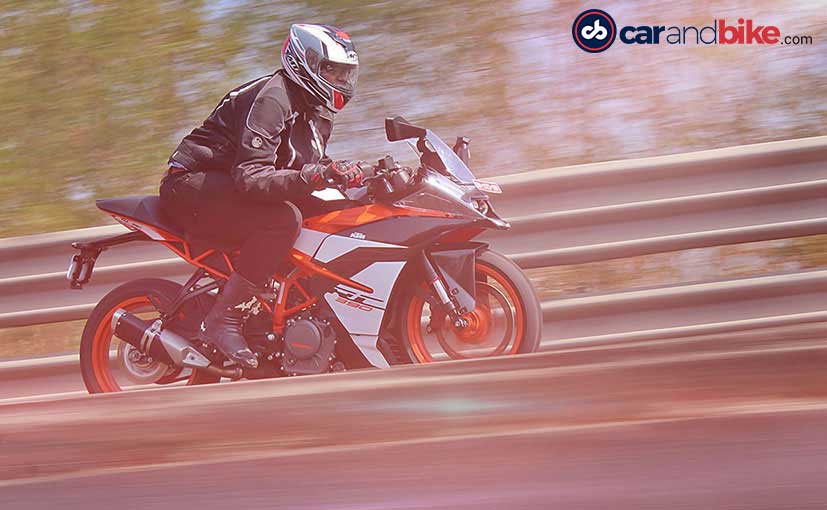
KTM introduced the Duke range globally in 2012 and the equally awaited RC 200 and RC 390 followed suit in 2013. India received the RCs in late 2014 and boy, the supersport machines have made a mark with its sharp and focused dynamics. Completing over two years now, KTM has updated the RC range globally for the 2017 model year and only recently launched it in India as well. We were invited to test the 2017 RC 390 at the Bajaj test track in Pune to get a first-hand account of all that’s changed on the new RC 390. Here’s what we think of it.
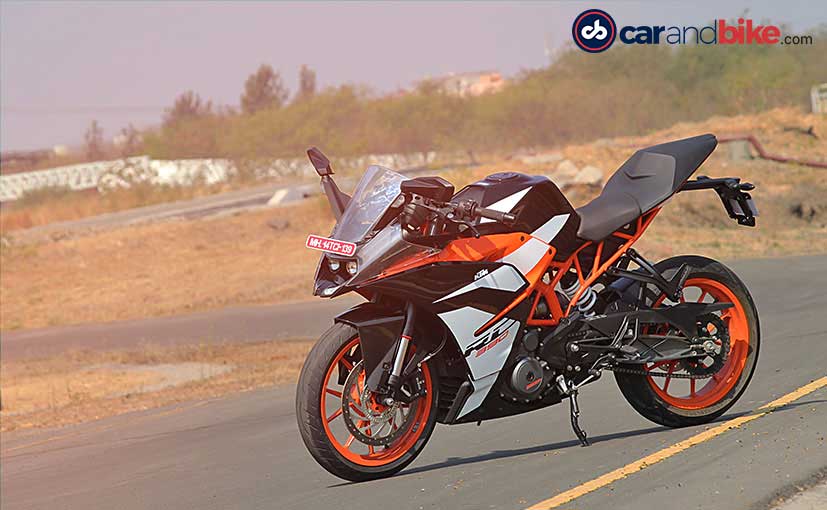
What’s New –
The 2017 KTM RC 390 is essentially the same bike in design as the older version, but with certain subtle styling upgrades. There is a new black and orange paint scheme that I really like and has been inspired from KTM’s new MotoGP bike (KTM makes its MotoGP debut this season). Unlike the older RC 390 that was white, the bike gets a dominant orange and glossy finish, which helps it stand out more effectively. The side fairing now accommodates a bolder RC 390 badge instead of ‘KTM’ that should help eliminate any doubt should you confuse it with the older RC 200. The under seat panel is now finished in orange instead of black and houses the new ‘RC 390’ badge.
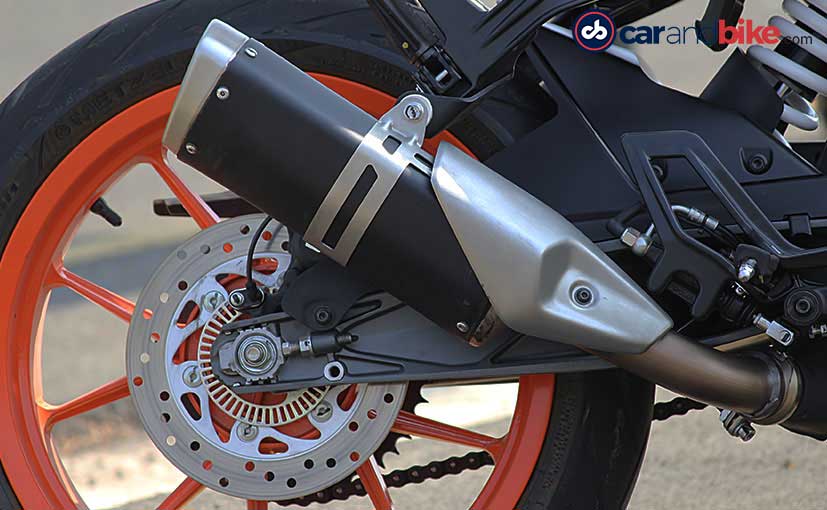
The side mounted exhaust is in place to meet stringent emission norms
The major change is the inclusion of a side-mounted exhaust replacing the underbelly unit and really makes it a complete bike, visually. The side canister is made of aluminium, which has made for minimum weight addition. The muffler though still remains an underbelly unit and has helped retain the centre of gravity, albeit with a five per cent deviation. The side mounted exhaust has also made way for improved ground clearance on the new RC. The squared off lower panel has been tweaked and is now slightly inverted, so you are less likely to scrape the underbelly at corners. This is a major update on the RC 390 and one that most buyers will be glad about. The other part I’m sure most of you will like is the new exhaust note on the RC 390. Unlike its predecessor, the new sound is throatier, feels more refined as well and has more bass to it at high speeds.
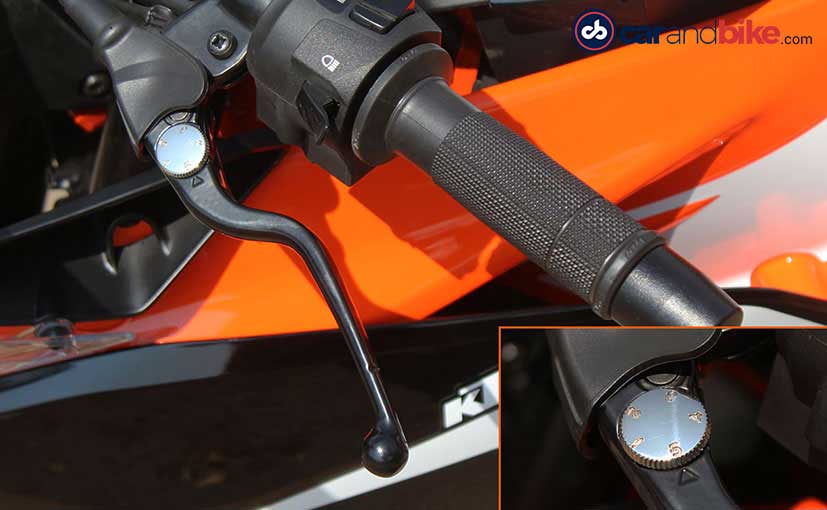
2017 KTM RC 390 gets adjustable levers, a segment first feature
The 2017 KTM RC 390 also gets adjustable brake and clutch levers, a segment-leading feature and allows you to adjust the distance as per your liking. While KTM does not confirm it, we are pretty sure the adjustable levers can be retrofitted to the older bikes as well. I also appreciate the wider rear view mirrors that offer better visibility over the outgoing bike. There is a new CAN-BUS system in place, which puts all wires in a single insulation, making for a cleaner appearance. Lastly, the digital instrument console now comes with real real-time efficiency, a much needed appreciated feature.
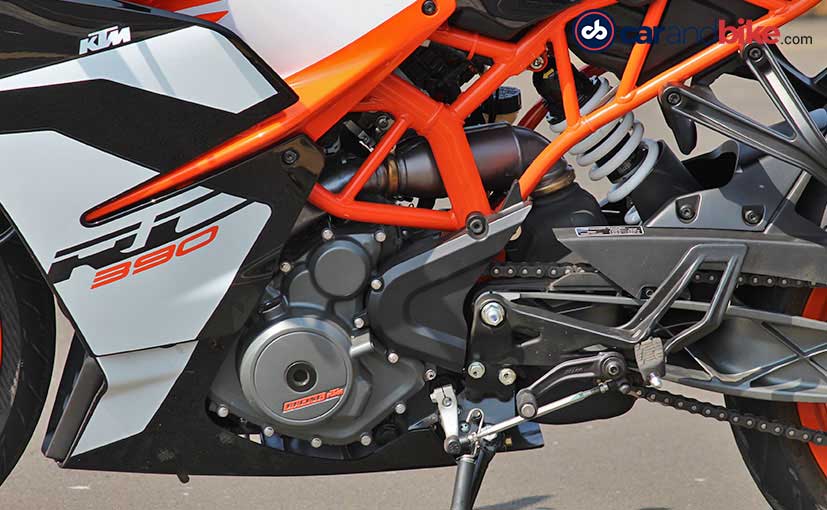
The Ride-by-Wire system acts a mediator between the engine and throttle
Technology Upgrades –
The new KTM RC 390 is now BSIV compliant in India and Euro 4 compliant in Europe, and that has brought a bulk of changes on the supersport. There is the much talked about Ride-by-Wire (RbW) technology on the motorcycle, a segment first feature; while stricter emissions have also made way for a side mounted exhaust. The system was only needed considering the Austrian bike maker had the task of retaining the same performance in a bid to meet stricter emission norms. This meant more advanced tech had to be brought in place to ensure the core focus of the bike remained intact.
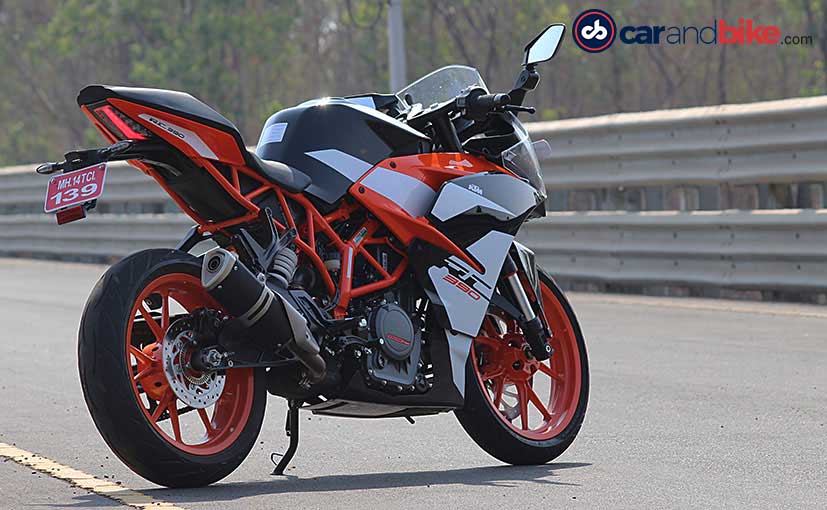
There is also an E-VAP system introduced for improved efficiency
And this is where ride-by-wire comes to play. The system essentially acts as a mediator between the throttle input and engine. While the engine would directly respond to the throttle earlier, ride-by-wire now understands the requirement and accurately feeds just the precise amount of input to the combustion chamber. The side mounted exhaust, on the other hand, was introduced to accommodate a larger catalytic converter on the bike. In addition, KTM has also introduced the E-VAP system on the 2017 RC 390 to further improve emissions. Now, the system minimizes fuel evaporation and sends the fumes to the engine for combustion. This, in return, not only makes way for cleaner emissions but also crisper power delivery.
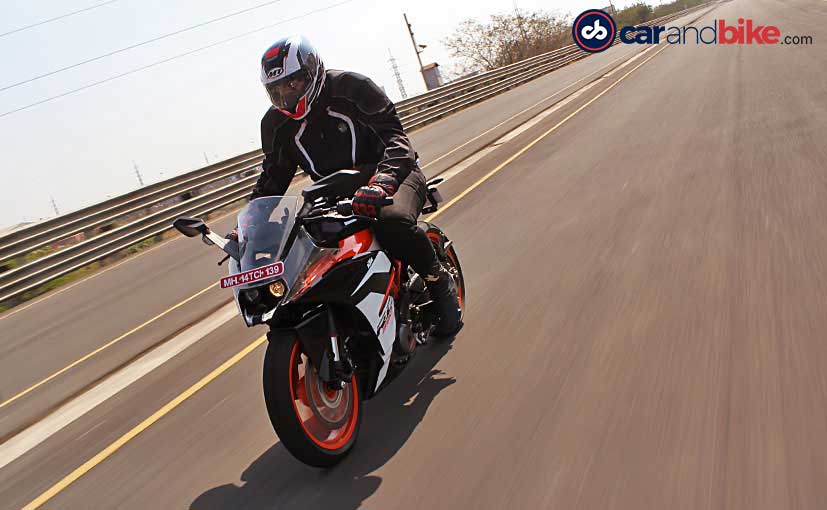
While power output remains the same, torque has increased by 1 Nm
How Does It Ride –
The new RC 390 uses the same chassis and suspension setup while the 373.2 cc single-cylinder motor continues to make 43 bhp of power, while torque has increased by 1 Nm to 36 Nm. The new RC 390 tips the scales at a kerb weight of 170 kg, a 6.5 kg increase over the older version. The good thing is that the weight increase is negligible and so is ride-by-wire, once you are on the saddle. As we took to the track, the RC 390 managed to impress with its seamless power delivery, which also is tad better than before. The other immediate change is in the way power is delivered and that comes from the shorter throttle, which along with the slipper clutch was introduced on the bike last year. The short throttle makes for quicker delivery; at least it feels that way and is less stressful on the wrist as well should you want to go flat out.
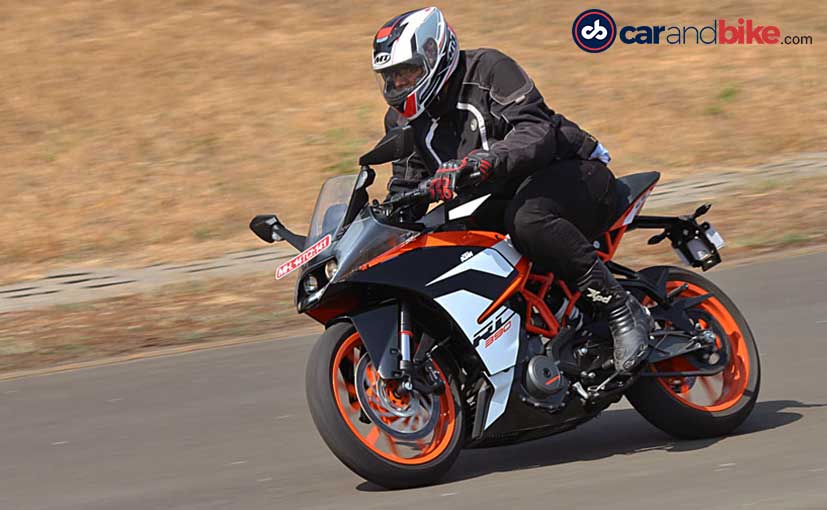
The additional weight is negligible if you are on or off the bike
The slipper clutch too has brought stark improvement on the new RC 390. Downshifts are fast and make the clutch feel a lot lighter, something that will also help when riding in heavy traffic conditions. The transmission continues to be a 6-speed unit and ratios remain the same inclined towards upshifting faster. But there is an improvement in the way the 390 behaves at low speeds in high gears. The bike pulls smoother now from 50-60 kmph in the sixth gear instead of stuttering and can be pulled all the way to 140 kmph. Vibrations kick in around the pegs just as you exceed the 145 kmph mark, but you have enough juice left from the motor to push even further.
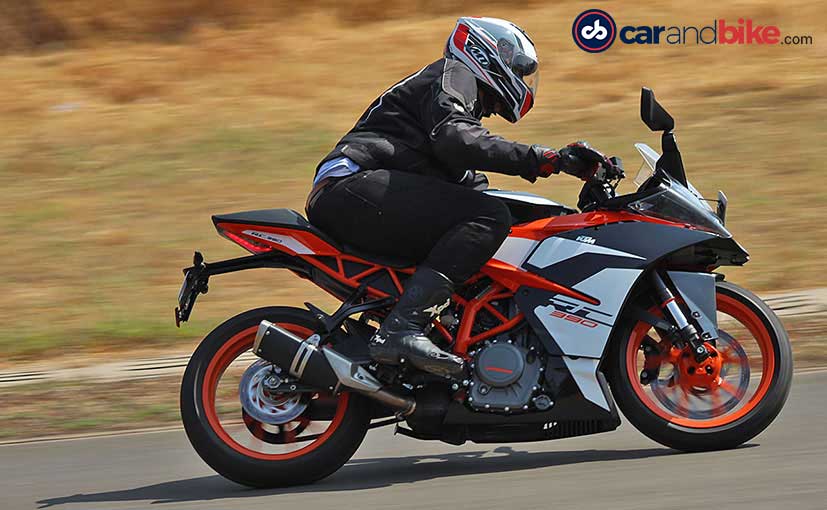
The 2017 RC390 feels at its agile best around corners
Around corners, the new KTM RC 390 handles the same as the outgoing model and is at its agile best. The weight increase is hardly felt whether you are on the bike or off it and hasn’t affected the handling in any way. The RC is one of those bikes that make even a novice rider look like a corner carver. That’s how friendly the dynamics are! It still remains a dedicated motorcycle as far as seating ergonomics are concerned with the low set handlebar and rear set foot pegs. The seat, KTM tell us, gets better cushioning this time for both rider and pillion with no change in the seat height, and should be more forgiving on open roads.
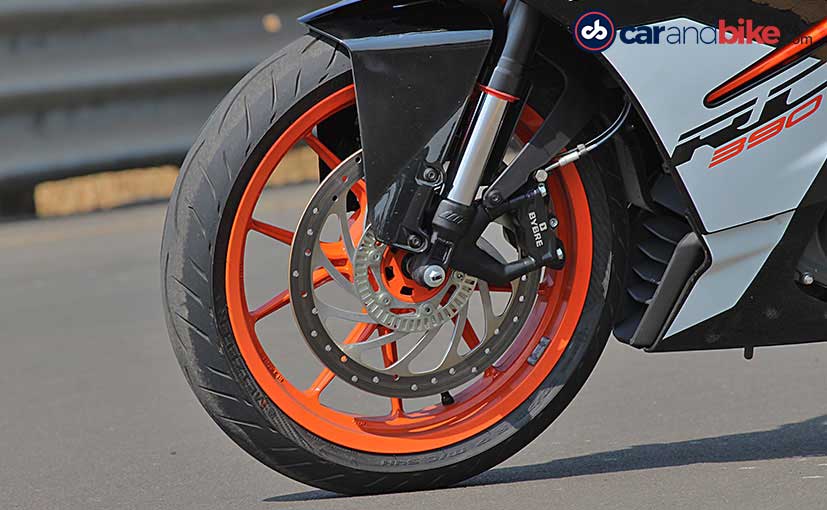
The front disc rotor is now larger by 20 mm
New Brakes –
One of the biggest grouse that I had with the older RC 390 was the brakes that didn’t do as much justice to the power. KTM has reacted well to the feedback and has introduced a bigger front disc brake on the supersport. You now get a 320 mm rotor, the size increasing by 20 mm, coupled with a repositioned caliper and a new master cylinder. The result is a more controlled stop from triple digit speeds. Switchable Anti-Lock Brakes (ABS) are offered as always and that’s exactly how we like it.
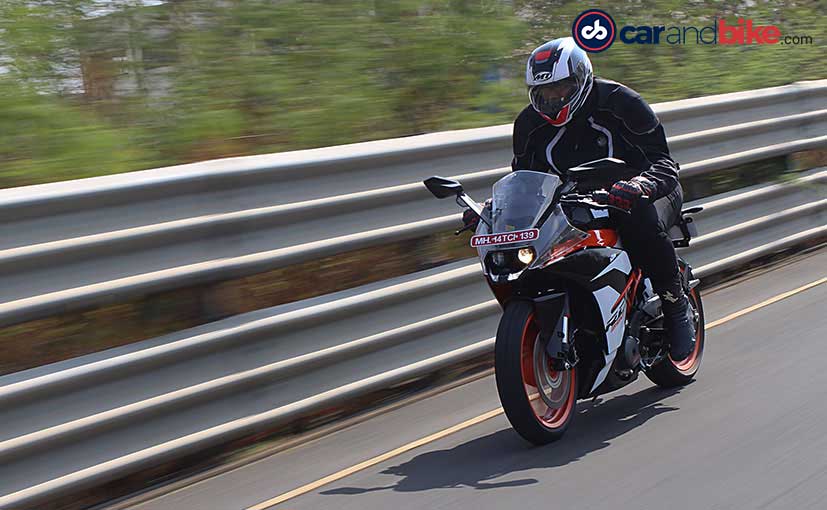
KTM is now providing new H rated tyres that are more durable by 15%
The other major change is the new H rated Metzelers instead of W rated ones. These tyres remain the same radial units as before but are now more durable with a 15 per cent increase in shelf life. If the W rated Metzelers lasted for about 10,000 km or so, the new ones will last for well about 13,000 odd km. The only trade off, however, KTM says is that the speed compliance has gone down from 240 kmph to 210 kmph, well above the bike’s top speed.
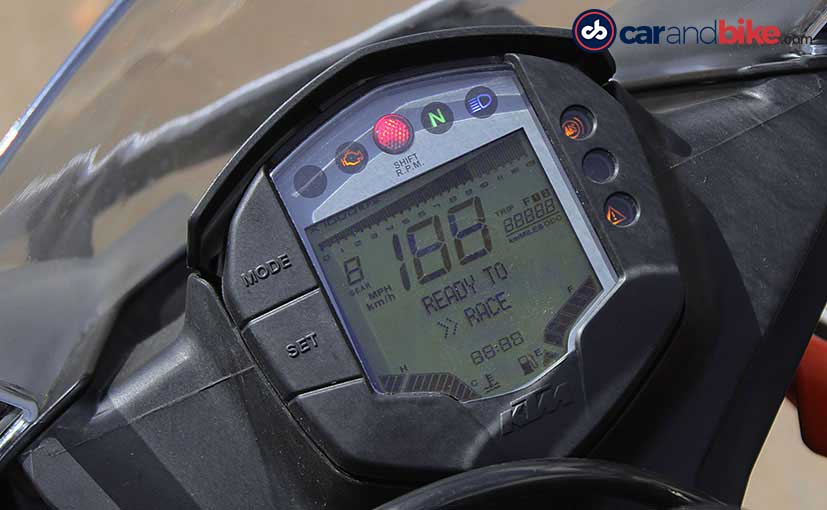
The instrument console remains the same, since the MY2017 RC isn’t all-new
Verdict –
With the 2017 edition, KTM has not only made the RC a far more performance friendly motorcycle but also two steps ahead of the competition. The 2017 RC 390 offers segment-leading features, not to forget the India model is the same spec as the export model. What makes things even more interesting is that all of the additional kit is offered at a premium of just ₹ 11,500. At ₹ 2.25 lakh (ex-showroom, Delhi), the KTM RC 390 still retains its value for money quotient, but mind you, it is not an all-new bike. Yes, it is a comprehensive upgrade, but if you are an existing KTM owner, the value might seem diminished. In that case, we suggest you wait for the new generation Duke range instead, which is due for launch in a couple of weeks. However, if you are making way to the RC range for the first time, the 2017 RC 390 is a compelling purchase and ascertains itself as one of the most lucrative performance bikes on sale.
[“source-ndtv”]
